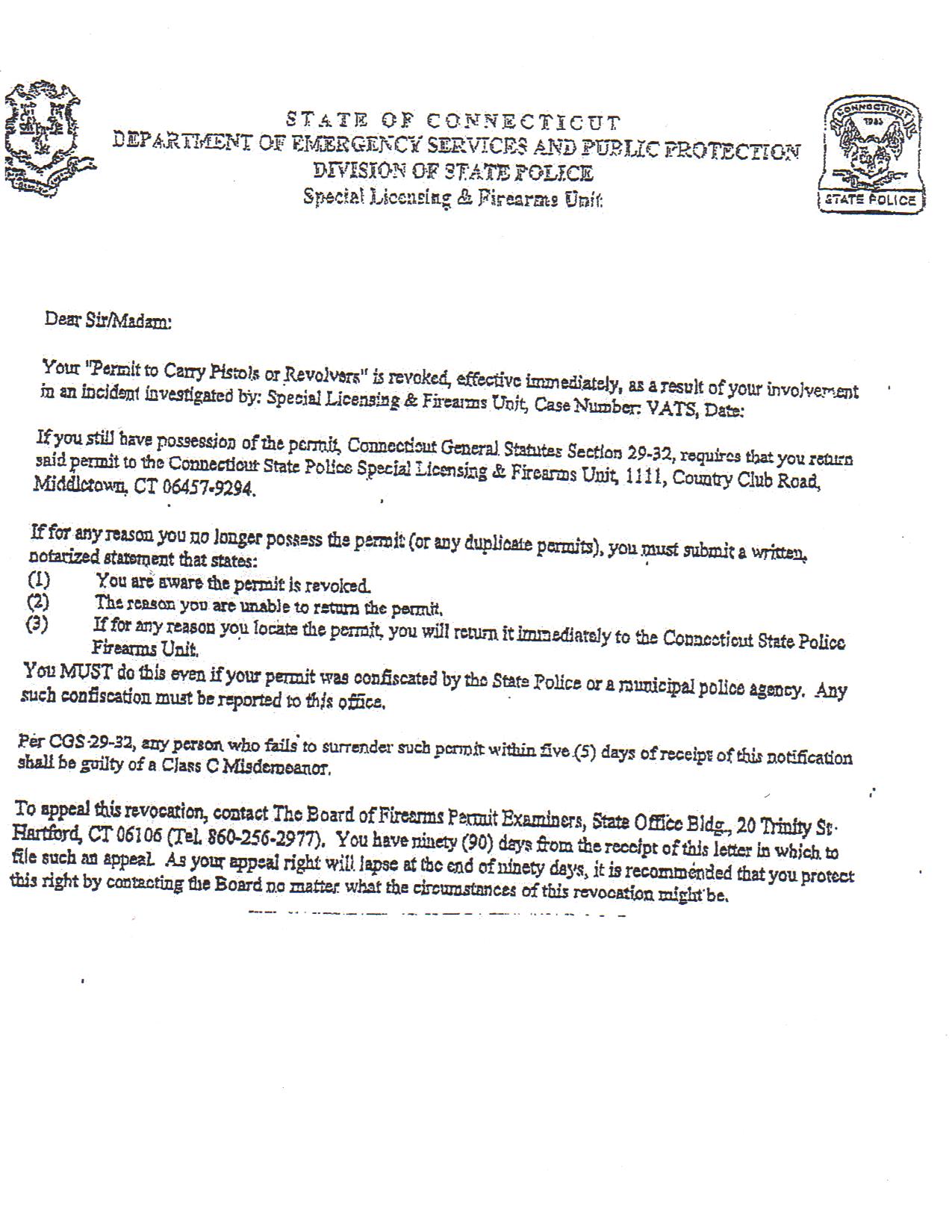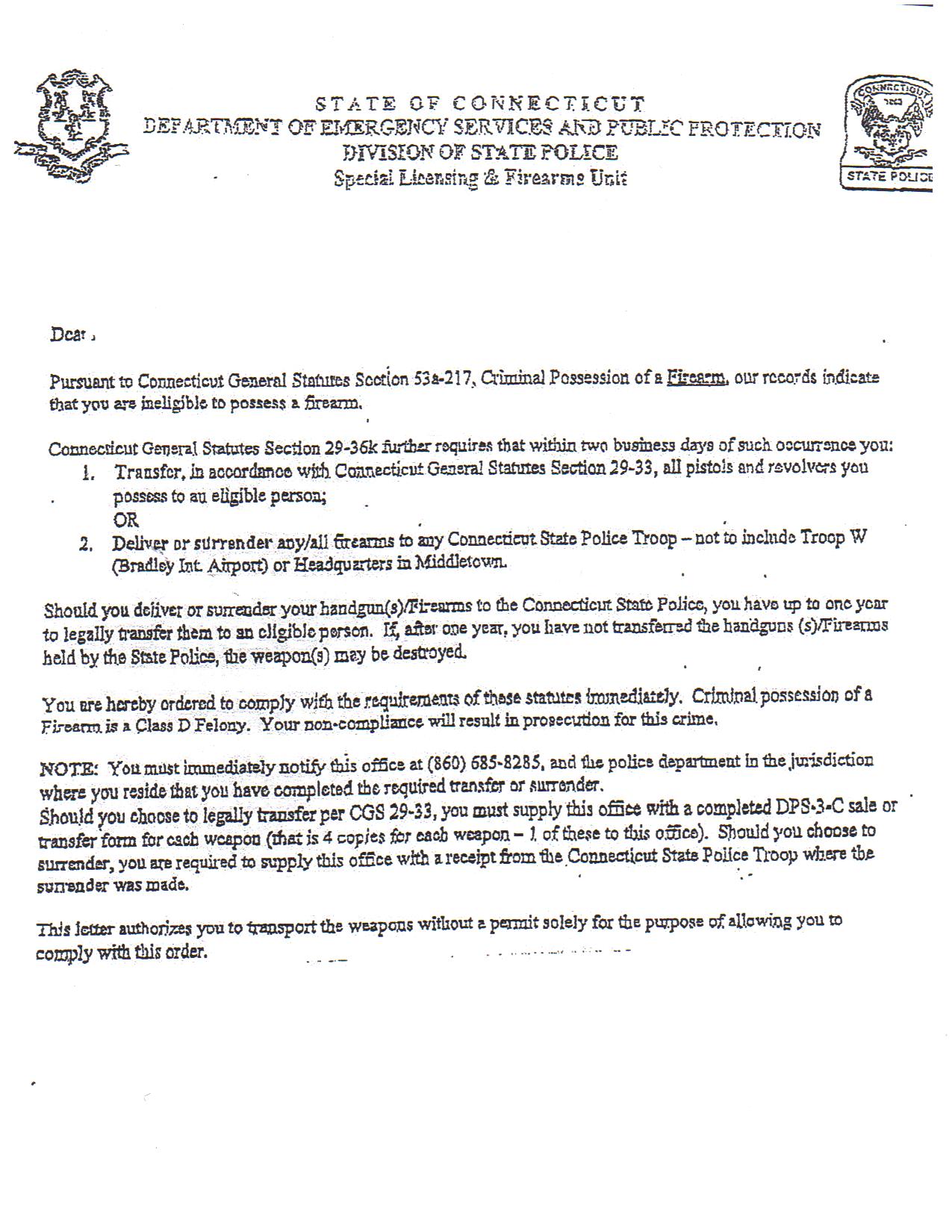On October 1st the Connecticut State Legislature’s reactionary response to the tragedy at Sandy Hook Elementary school went into effect. Public Act No. 13-3 requires all people that voluntarily admit to a hospital for mental health reasons (not solely for drug or alcohol treatment) have their names placed in a database administered by the Department of Mental Health and Addiction Services – for the purpose of automatic suspension of Second Amendment rights. This database will link with a database held by the state police that includes all gun permit holders, registered gun owners and anyone who has applied for a gun permit. If there is a “match” between the two databases a letter will go out informing the individual that their Second Amendment rights have been suspended (letter below). Although you will not receive a letter from the state police, if you are not a “match” you will be notified of your name being put in the database and of the suspension of Second Amendment rights sometime after voluntary admission. The law does not require notice be given to people prior to admitting themselves into a hospital.
I wonder if this database will be used for reasons beyond the already unacceptable intended purpose.
I wonder how people that carry a gun for a living and/or first responders will be impacted by this law.
I wonder if the law documents people as unfit to enjoy Constitutional rights without due process.
I wonder if this law will create yet another reason for not seeking support.
I wonder if some providers will follow in the Veteran Administration’s footsteps and refuse to comply with this law.
I wonder why the legislature passed this law when seemingly most of the people they represent are opposed.
I wonder why they explicitly excluded people seeking drug or alcohol treatment.
I wonder how people will feel, receiving one of the following letters upon returning home from a voluntary hospital stay:


I wonder if seeking support is an “incident” to be “investigated.”
I wonder if the Miami Dolphin football player that recently checked himself into a hospital for emotional distress resulting from bullying and racial discrimination would have sought help if he lived in Connecticut.
Nationwide, discriminatory practices have me wondering if we are moving towards repression and marginalization versus building community and mitigating violence. I started writing paragraphs detailing what I perceive as issues with Connecticut’s database. I planned on writing anecdotes about police officers seeing unspeakable tragedies, our military folks coming home from Afghanistan, or people losing a loved one who are understandably struggling with their experience and reach out for support only to end up in a database. I decided to primarily let the letters and the law do the talking.
People have suggested that I advocate for the purpose of persuading the state police to write a “friendlier” letter. I am going to focus on the problem and not the resulting symptoms. The legislature brought law enforcement into a realm that it does not belong. Efforts should be aimed at overturning this blatant violation of human and constitutional rights.












Yes, databases in Connecticut, ID cards in California, soon, no doubt, ID chips or tattoos somewhere else. And it isn’t hard to figure out what they will be used for next.
What are we waiting for?
Report comment
1 this law is blatent discrimination and could easily end up being incitement to violence towards people who have mental health diagnosis
2 it is scapegoating people with mental health diagnosis instead of looking at the causes of gun violence in the USA
3 it is medicalization of violence in a way that lets the gun companies off the hook in the same way as the medicalization of excessive alcohol consumption by the invention of the Alcholholism diagnosis let the alcohol industry off the hook for the social effects of cheap alcohol.
Report comment
“Is emotional distress criminal?”
Absolutely not. But asking for help at a hospital is.
(My response to ridiculous situations that I cannot directly influence is to make ridiculous statements that pass for jokes.)
Report comment
I’m really and truly torn on this issue. Personally, I believe that anything that will reduce the number of guns is a good thing. I think having the general public carrying guns is absolutely insane.
Now, as to the discrimination against the so-called mentally ill, again I’m conflicted. Clearly, seeking help voluntarily for emotional distress shouldn’t be penalized. As Deron points out, all that will happen is that people won’t reach out. (As an aside, I do find the drug/alcohol exclusion intriguing.)
But are we really going to take the position that somebody who experiences psychosis should be allowed to carry a gun?
The bigger issue here, I think, is what else that database will be used for. I was recently asked to sign an information release form that would permit the free flow of information between my psychiatric team and the police, hospital, various social services, etc. but I declined. I know the thin edge of the wedge when I see it.
Report comment
Whats that form called ?
Report comment
Sorry, just can’t remember what it was called. The gist of it was that all agencies would be involved in the case of an emergency. My case worker was quite surprised that I refused to sign. He said “This is just an annual update to allow us to provide the same service we’ve already been providing you.” Fair enough, but the thing is that I don’t want their service to continue.
Report comment
Great topic !
Q. “I wonder why they explicitly excluded people seeking drug or alcohol treatment.”
Could it be the higher rate of suicide among law enforcement officers or the higher rates of alcoholism, divorce, and drug abuse…
Report comment
Perhaps because that would include too many people? Or perhaps because addictions aren’t really considered hard core mental disorders, even though a lot of the symptoms are the same?
Report comment
They have that ‘dual diagnosis’ scam to add a DSM diagnosis to people with addictions. Rarely does anyone goto rehab and not get labelled with something.
How is that goig to work out ?
Report comment
Q . I wonder if this database will be used for reasons beyond the already unacceptable intended purpose.
Like maybe at the DMV ?
http://www.transportation.wv.gov/dmv/Forms/DMVForms/DMV-DS-23P_Application-for-a-Drivers-License-or-ID-Card-wf.pdf
Maybe they will start a National Mental Health Offender Registry and make it just like the already existing National Sex Offender Registry ?
Even school children that get caught in big pharmas mental health screening dragnets could be included.
It’s all about prevention!
Report comment
It is ironic that those seeking substance abuse treatment are excluded, since the data I’m aware of suggest that when we control for substance abuse, “mentally ill” people aren’t any more dangerous as a group than anyone else. But people who use substances ARE more dangerous as a group! If we were to select a group whose second amendment rights were to be rescinded (not that I’d agree with such a blanket action in any case), it seems we ought to exempt the “mentally ill” who DON’T have a substance abuse problem, and focus on the substance abusers as the most likely to cause violence.
Of course, there’s also the use, sometimes enforced, of LEGAL substances that might push a person to violent action, but we don’t want to talk about THAT, do we?
Perhaps there are too many politicians and rich folks that have reported for substance abuse treatment and they can’t allow this “stigma” (aka prejudice) about violence be applied to them.
—- Steve
Report comment
Psychiatrists Explain Why Disarming the ‘Mentally Ill’ Won’t Prevent Mass Murders.
http://reason.com/blog/2013/10/16/psychiatrists-explain-why-keeping-guns-f
Report comment
Thanks for the link, Copy-cat. The NRA’s LaPierre is one of the most bigoted, frightening, hateful people I know of.
Report comment
“Is emtional distress criminal?”
Good question.
My answer would be that *treatment* for emotional distress is far too often criminal.
We can do better:
http://discoverandrecover.wordpress.com/mental-health-freedom-and-recovery-act/
Be well,
Duane
Report comment
That link sais
Take Action
Please feel free to copy, distribute or post, especially to psychiatric consumer/survivor groups; mental health professionals; and holistic practitioners who have a desire to reform the current system. Encourage their involvement in making sure this vision becomes a reality.
Copy cats love to copy, distribute or post !!!
Report comment
Thank you so much for bringing this issue to my attention. I was previously unaware that even involuntary patients automatically lose their constitutional rights, and am, simply, horrified that our society allows people in emotional distress to lose their liberties, but those that harmed or traumatized those individuals and led to their distress can own deadly weapons. I was prompted to write about this on my own blog, in an article which I titled, “My Abuser Gets To Keep His Civil Rights, But I Don’t,” (found at http://wp.me/p4ht3r-53). We have one mass shooting after another, and would rather blame those with psychiatric labels than come up with real solutions.
Report comment